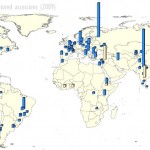- A common collection of publications on neglected crops.
- Crescent, maybe, but fertile, not so much.
- “The beaches now are empty of herring roe, its harvest a lost art.”
Draft 2nd State of the World’s PGR is out
I should really have pointed to this earlier. The draft Second Report on the State of the World’s Plant Genetic Resources for Food and Agriculture (SOTW2) was presented for review to the Fourth Session of the Intergovernmental Technical Working Group (ITWG) on Plant Genetic Resources for Food and Agriculture held at FAO headquarters, Rome on 15-17 July 2009. The First State of the World’s PGRFA report is of course more than ten years old.
All the documents relevant to the ITWG meeting are online, including the draft SOTW2 report, as a large pdf. The idea is that, after whatever changes the ITWG recommended are taken into account, the final version of the SOTW2 will be presented to the Twelfth Session of the Commission on Genetic Resources for Food and Agriculture (Rome, 18-23 October 2009) for endorsement.
The process of developing SOTW2 has been tortuous, and no doubt far from perfect, but this does constitute the best data we have on what’s happening in plant genetic resources conservation and use worldwide.
I’m afraid I can’t resist quoting some headline numbers on the ex situ side, but there are also chapters on in situ, use, national programmes and legislation, regional and international collaboration, access and benefit sharing the full monty.
Chapter 3 shows that the total number of accessions conserved ex situ world-wide has increased by approximately 20% (1.4 million) since 1996, reaching 7.4 million. It is estimated, however, that less than 30% of this total are distinct accessions (1.9 – 2.2 million). During the same period, new collecting accounted for about 220,000 accessions.
And again:
There are now more than 1,750 individual genebanks worldwide, about 130 of which hold more than 10,000 accessions each. There are also substantial ex situ collections in botanical gardens, of which there are over 2,500 around the world. Genebanks are located on all continents, but there are relatively fewer in Africa compared to the rest of the world. Among the largest collections are those that have been built up over more than 35 years by the CGIAR and are held in trust for the world community. In 1994 the Centres signed agreements with FAO bringing their collections within the International Network of Ex Situ Collections. These were subsequently brought under the International Treaty on Plant Genetic Resources for Food and Agriculture in 2006 (ITPGRFA – see Chapter 7).
Still a lot of room for rationalization. Here’s a map of the localities of those 130 large genebanks, which is also available on the WIEWS website (click to enlarge).
Japanese agrobiodiversity art
Adam at Mutantfrog Travelogue, which seems to be a blog about things Japanese, has a post about a craft called Mizuhiki (水引). This involves the decorative use of twine made from a special kind of traditionally-produced paper called Washi or Wagami (和紙). Washi is made from all kinds of different agrobiodiversity:
Washi is commonly made using fibers from the bark of the gampi tree, the mitsumata shrub (Edgeworthia papyrifera), or the paper mulberry, but also can be made using bamboo, hemp, rice, and wheat.
That “gampi tree” gave me a bit of trouble, but I finally ran it to ground. It seems to be Wikstroemia sikokiana in the Thymelaeaceae. The paper looks beautiful. Anyway, in researching all this I came across a little gem:
In 1869 the then Prime Minister, William Gladstone, requested a report on Japanese paper and papermaking from the British Embassy in Japan. A thorough investigation was carried out by Sir Harry Parkes and his team of consular staff in different Japanese towns, resulting in the publication of a government report, “Reports on the manufacture of paper in Japan“, and the formation of a collection of 400+ sheets of handmade paper. The main parts of this collection are now housed in the Paper Conservation Laboratory of the Victoria and Albert Museum, and the Economic Botany Collection of the Royal Botanic Gardens, Kew. In 1879 Kew sent duplicate samples to Glasgow, Sydney, Melbourne and Adelaide, but these have been lost. The Parkes paper collection is important because the origin, price, manufacturing method and function of each paper was precisely documented.
Something to check out the next time I’m in London.
Nibbles: Potatoes, Tortillas, EU agricultural promotion, Human diversity, Children
- Potato fest at the Vavilov Institute next week. Report for us!
- Gary Nabhan on tortillas made of “mesquite pods, the flour of ground, popped amaranth seeds, wheat flour and olive oil.”
- EU to fund promotion of agricultural products, including information campaigns on the EU system of PDO, PGI, TSG, QWPSR et al. Via.
- Diversity good even within individuals.
- Engaging children in Sahelian agriculture and agrobiodiversity.
Agrobiodiversity fellowship available
The call for applications for the 2010 Vavilov-Frankel Fellowship is out. Good luck!
